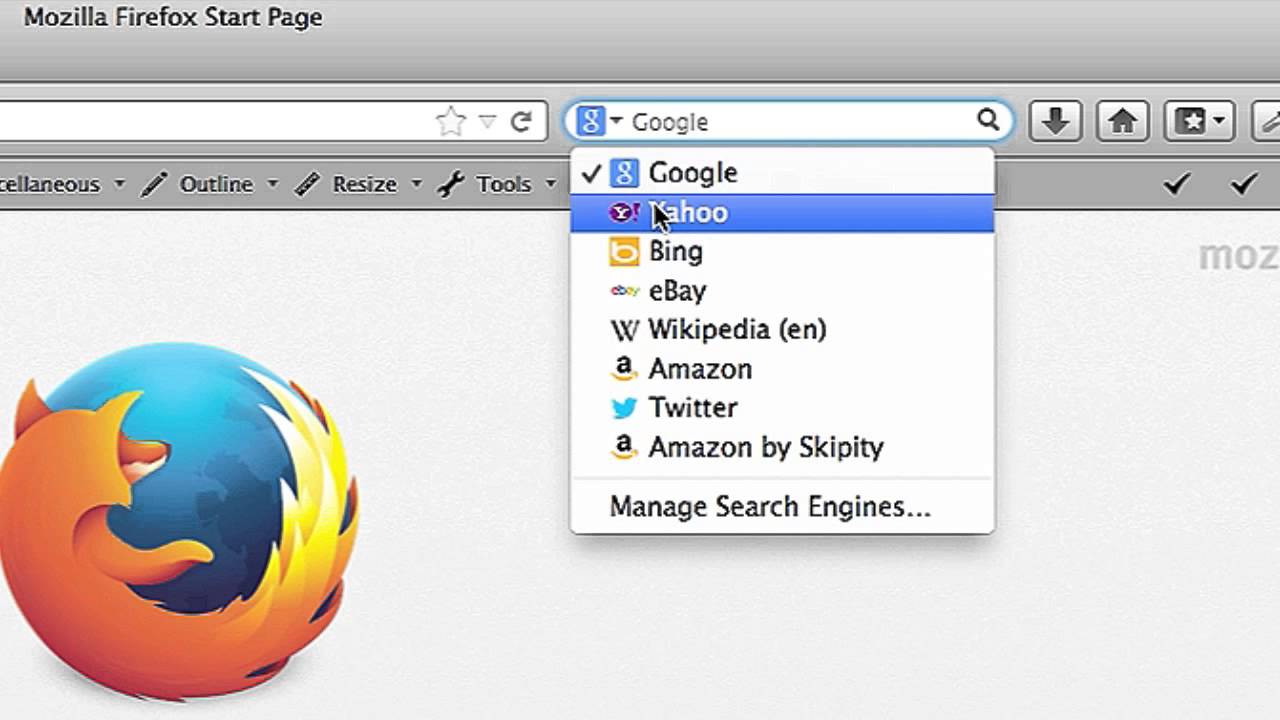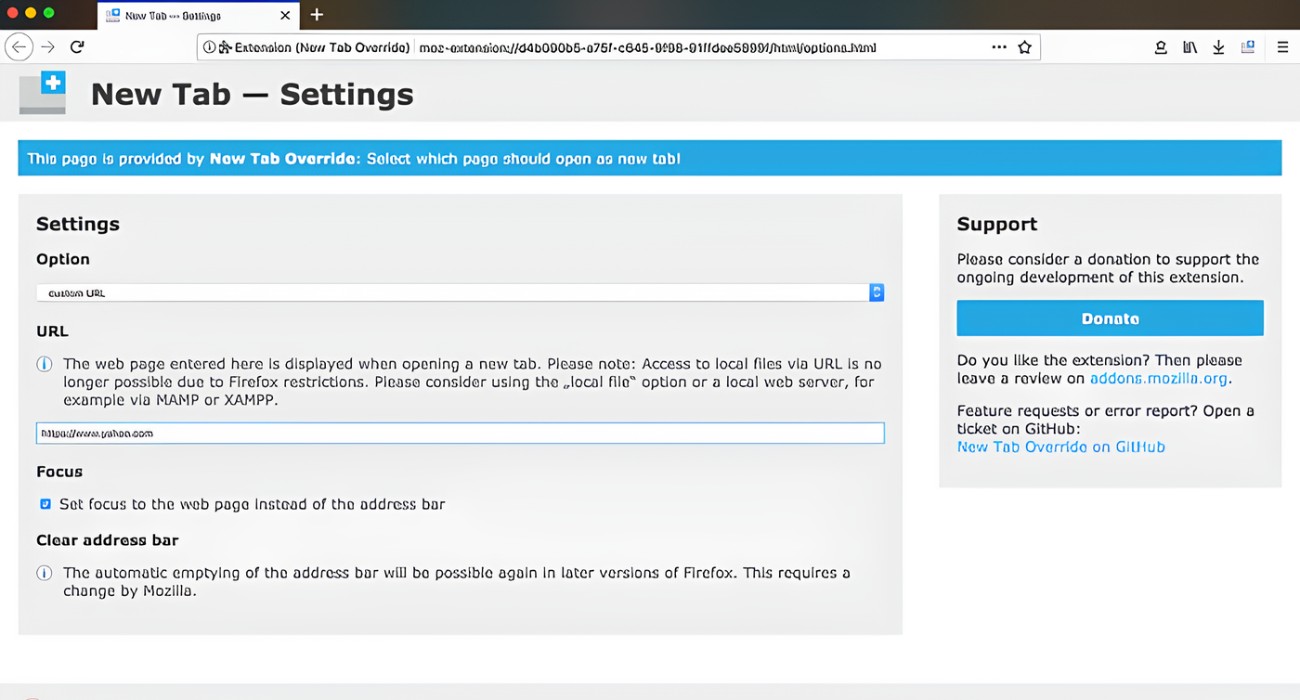Introduction
When you open your web browser, the default search engine is often the gateway to the vast expanse of the internet. For many users, the default search engine is the starting point for their online journey, shaping their browsing experience and influencing the results they encounter. In the case of Firefox, one of the most popular web browsers, the default search engine plays a pivotal role in shaping the user's interaction with the digital realm.
Understanding why Firefox defaults to Yahoo as its search engine is a topic that piques the curiosity of many users. This seemingly unconventional choice has sparked discussions and raised questions about the rationale behind this decision. Delving into the history of Firefox's default search engine and the partnership between Firefox and Yahoo sheds light on the factors that have shaped this unique arrangement.
As we embark on this exploration, we will uncover the evolution of Firefox's default search engine, the dynamics of the partnership between Firefox and Yahoo, and the impact of the default search engine on users. Additionally, we will provide insights into how users can customize their browsing experience by changing the default search engine in Firefox. Join us on this journey to unravel the intricacies of Firefox's default search engine and gain a deeper understanding of its significance in the realm of web browsing.
History of Firefox's default search engine
Since its inception, Firefox has been synonymous with innovation and user-centric features. One of the pivotal elements that define the browsing experience within Firefox is its default search engine. The journey of Firefox's default search engine is a testament to the browser's commitment to providing users with a seamless and personalized web exploration.
In the early days of Firefox, the default search engine was the venerable "Mozilla Firefox Start Page," which provided users with a simple and straightforward search interface. However, as the digital landscape evolved, so did the demands and expectations of users. Recognizing the need to offer a more comprehensive and versatile search experience, Firefox ventured into partnerships with various search engines to enhance its default search capabilities.
The evolution of Firefox's default search engine took a significant turn with the emergence of the partnership with Google. This collaboration marked a pivotal moment in Firefox's history, as Google became the default search engine for the browser. The integration of Google's powerful search algorithms and expansive index of web content resonated with users, elevating their browsing experience within Firefox.
As the digital ecosystem continued to evolve, Firefox sought to diversify its default search engine offerings to cater to the diverse preferences of its user base. This led to the inclusion of alternative search engines such as Yahoo and later, to a lesser extent, Bing. The strategic decision to incorporate Yahoo as a default search engine reflected Firefox's commitment to providing users with choices and ensuring that their browsing experience aligned with their individual preferences.
The dynamic nature of Firefox's default search engine reflects the browser's adaptability and responsiveness to the ever-changing digital landscape. The history of Firefox's default search engine underscores the browser's dedication to empowering users with a versatile and customizable browsing experience, where the choice of search engine aligns with their unique needs and preferences.
This journey through the history of Firefox's default search engine illuminates the browser's evolution and its unwavering focus on enhancing the user experience through strategic partnerships and a commitment to choice and diversity in search engine options.
The partnership between Firefox and Yahoo
The partnership between Firefox and Yahoo marked a significant milestone in the evolution of Firefox's default search engine. In 2014, Mozilla, the non-profit organization behind Firefox, announced a five-year partnership with Yahoo, designating Yahoo as the default search engine for Firefox in the United States. This strategic collaboration aimed to provide users with an alternative search experience while fostering healthy competition in the search engine landscape.
The partnership with Yahoo represented a departure from the long-standing default search engine relationship between Firefox and Google. This shift underscored Mozilla's commitment to offering users a diverse array of search engine options, aligning with its core principle of empowering users to tailor their browsing experience to their preferences.
The collaboration with Yahoo brought forth a renewed focus on user choice and the importance of providing alternative search engine options within Firefox. This move resonated with users who sought variety and the ability to align their browsing experience with their individual preferences.
The partnership between Firefox and Yahoo extended beyond a mere default search engine arrangement. It encompassed a shared commitment to user privacy and data protection, reflecting Mozilla's dedication to safeguarding user interests. This emphasis on privacy and user-centric values further solidified the alignment between Firefox and Yahoo, fostering a partnership rooted in mutual respect for user rights and preferences.
The integration of Yahoo as the default search engine in Firefox introduced users to a distinct search experience, leveraging Yahoo's search algorithms and interface to offer a fresh perspective on web exploration. This diversification of search engine options within Firefox exemplified the browser's responsiveness to user feedback and its proactive approach to enhancing the browsing experience.
The partnership between Firefox and Yahoo exemplified a strategic alliance aimed at enriching the user experience and promoting a healthy ecosystem of search engine choices. It underscored Mozilla's commitment to fostering diversity and competition in the search engine landscape, ultimately empowering users to shape their browsing journey according to their unique preferences.
This partnership between Firefox and Yahoo not only broadened the horizons of search engine options within the browser but also exemplified Mozilla's dedication to championing user empowerment and choice in the digital realm.
The impact of the default search engine on users
The default search engine within a web browser holds significant influence over the user's browsing experience, shaping the way they access information, discover content, and navigate the digital landscape. In the case of Firefox, the choice of default search engine has a profound impact on users, influencing their search results, the relevance of the content they encounter, and the overall satisfaction with their browsing experience.
The default search engine serves as the gateway to the internet for many users, guiding their exploration and shaping the information they encounter. When Firefox defaults to Yahoo as the search engine, it introduces users to a distinct search experience, characterized by Yahoo's search algorithms, interface, and the unique set of search results it delivers. This shift in the default search engine can significantly impact the relevance and diversity of search results, influencing the breadth of information users encounter during their browsing sessions.
Furthermore, the default search engine plays a pivotal role in shaping the user's perception of the browser itself. Users often associate the default search engine with the browser's identity and capabilities, forming a connection between the two. Therefore, the choice of default search engine within Firefox can influence users' perceptions of the browser's search capabilities, user-friendliness, and alignment with their individual preferences.
The impact of the default search engine extends beyond the immediate search results and user perceptions. It also reflects the browser's commitment to user choice and diversity in search engine options. By offering Yahoo as a default search engine alongside other options, Firefox empowers users to tailor their browsing experience to their preferences, fostering a sense of inclusivity and customization.
Moreover, the default search engine within Firefox can influence users' trust and confidence in the browser's commitment to privacy and data protection. The choice of search engine reflects the browser's stance on user privacy and the handling of sensitive information, thereby impacting users' confidence in the browser's ethical principles and alignment with their values.
In essence, the default search engine within Firefox holds a multifaceted impact on users, shaping their search results, perceptions of the browser, sense of inclusivity, and confidence in the browser's ethical stance. This underscores the significance of the default search engine in shaping the user's browsing experience and the browser's relationship with its user base.
How to change the default search engine in Firefox
Changing the default search engine in Firefox is a straightforward process that empowers users to tailor their browsing experience to their preferences. Whether you prefer the comprehensive search results of Google, the distinctive interface of Yahoo, or the seamless integration with Bing, Firefox offers a simple method to customize your default search engine. Here's a step-by-step guide to changing the default search engine in Firefox:
-
Accessing the Search Preferences: To begin, open your Firefox browser and navigate to the upper-right corner of the window. You will find a search bar with the current default search engine's icon. Click on the magnifying glass icon to open the search menu.
-
Selecting a New Search Engine: Within the search menu, you will find a list of available search engines. Click on the current default search engine's icon to reveal a dropdown menu showcasing alternative search engines such as Google, Yahoo, Bing, and more. Select your preferred search engine from the list.
-
Adding New Search Engines: If your desired search engine is not listed, you can click on "Add more search engines" at the bottom of the dropdown menu. This will direct you to the Firefox Add-ons page, where you can explore and install additional search engine options to expand your choices.
-
Setting the New Default Search Engine: Once you have selected your preferred search engine, Firefox will prompt you with the option to set it as the default search engine. Click on "Change Search Settings" or a similar prompt to confirm your selection and make the new search engine the default option for your browsing sessions.
-
Verifying the Change: To ensure that the change has taken effect, revisit the search menu in the upper-right corner of the Firefox window. You should see the icon of your newly selected default search engine displayed in the search bar, indicating that the change has been successfully implemented.
By following these simple steps, you can seamlessly customize your browsing experience within Firefox by changing the default search engine to align with your preferences. This flexibility empowers users to curate their web exploration journey, ensuring that their default search engine resonates with their individual needs and enhances their overall browsing experience within Firefox.

























